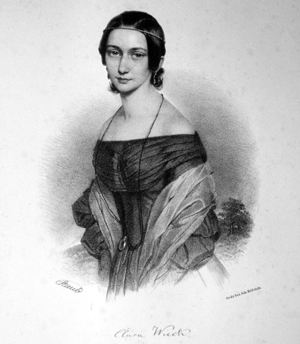When you walk up one of the stairs to the Main Hall of the Musikverein, a
bust of Clara Schumann stares at you. Especially for tonight’s
performance of Detlev Glanert’s orchestration of Brahms’s Four
Serious Songs that he wrote after the death of his one great love, her
face glowed with a special aura. Johan Reuter gave it his all as he sang the
dour and depressing four songs. But it was Semyon Bychkov’s in-depth and
lush interpretation of Mahler’s First Symphony that brought out the
distinct sound of the Wiener Philharmoniker. The contrast of sorrow and hope
could not have been more heavy and uplifting.
Johan Reuter’s bass voice carries the gloom and ashen mood of
Brahms’s Four Serious Songs. He brought all the anguish of lost
love that Johannes must have felt for Clara. Brahms’s choices of four
biblical texts didn’t give positive mood any much of an option. It truly
was a farewell to love and beauty, perhaps even a farewell to hope.Reuter handsomely bellowed through the sorrowful words, as Glanert’s orchestration included charming interludes of suitable modern dissonances entwined within Brahms’ melodies.
 Clara Schumann (nÈe Wieck) by Andreas Staub [Source: Wikipedia]
Clara Schumann (nÈe Wieck) by Andreas Staub [Source: Wikipedia]
The atmosphere in the Musikverein was stifling in sorrow. People applauded,
but many others sat subdued, some tired, others downtrodden. Bychkov achieved
the effect Glanert and Brahms wish to achieve in this ode to the passing of
Clara Schumann. So when Mahler’s First Symphony began after the
intermission, the promise of hope and joy of life was the perfect antidote to
the dour procession before.
Indeed, Bychkov blew me away with the Viennese’s verve during the entire symphony. And truly, I had never experienced the Wiener Philharmoniker perform this rich and conjoined. All the section flowed into each other, each layer transparently on top of the other, leading to the comforting glow of cinderwood on a hearth. The strings had a texture that emanated a gorgeous red, wooden glow. I had never heard such sound before.
Bychkov certainly took his time, elongating with full effect the lush
passages with each section during the opening movement of Mahler’s
“Creation of the Earth”. The oboe blissfully ascending ever so
fragile above the orchestra and letting its timbre radiate over the cohesive
sound from the musicians. Truly an awakening.
The Scherzo with its catchy dances made for some fabulous momentum that
swept me off my feet. And during the Frères Jacques passages,
although at several moments the momentum did sag, Bychkov knew how to
consistently distinguish the different sections, while keeping them into one
flowing tempo. It was enchanting.
The Finale proved a true tempest and awoke Austrian passion as was clear
with the thunderous applause following the performance. People ceaselessly
clapped. After all the musicians had left, Bychkov returned to accept the the
continuing applause from the audience that truly adored this noble
Titan Conductor.
I rarely heard so much lush detail in a Mahler Symphony. It certainly
belongs to one of my best Mahler experiences, and it was perfectly programmed
against Brahms’s sad farewell to life. It seemed like a perfect
celebration to remember 2016, and entering due to Mahler’s “Birth
of the World” into 2017 with a newly determined hope. When I walked down
back the stairs, I turned my head back to glance at Clara’s bust. It
almost seemed she was smiling.
David Pinedo
image=http://www.operatoday.com/Johan_Reuter.png
image_description=Johan Reuter
product=yes
product_title=Johan Reuter sings Brahms with Wiener Philharmonike
product_by=A review by David Pinedo
product_id=Above: Johan Reuter